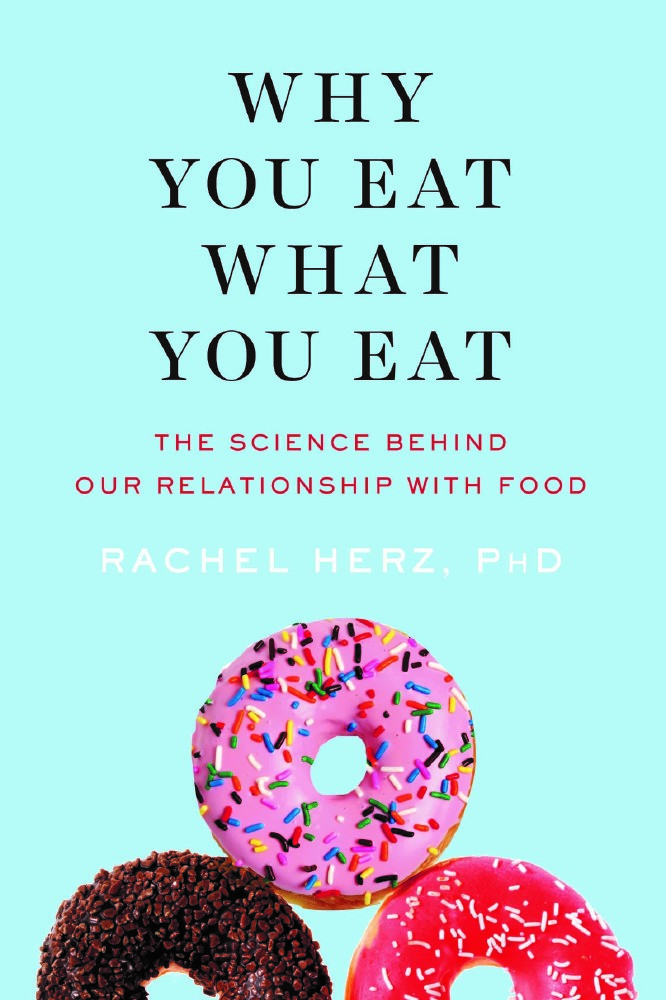By Rachel Herz, PhD

Why You Eat What You Eat
Tasting Something Sweet Makes You Nicer
An extensive research collaboration between scholars at North Dakota State University and Gettysburg College in Pennsylvania found that not only do we think people with a sweet tooth are friendlier than people who prefer other tastes, tasting something sweet makes all of us kinder. Indeed, not only did people feel more aggregable after tasting chocolate compared to a plain cracker or nothing at all, they also volunteered more of their time to help someone else.
Familiar Foods Are Filling
Research on what foods are most satiating is stunningly sparse, but the most compelling evidence suggests that foods we are most familiar with make us feel the most full. A study conducted at the University of Bristol found that the correlation between how frequently someone ate a certain food and how much they expected it would fill them up was an astonishing 0.86 (the correlation between height and weight is only 0.70). Specifically, pasta and potatoes, which were reported as most consumed, were rated as six times more filling than holiday foods such as cashews, even though cashews have almost six times more calories per ounce than potatoes do.
Believing A Food Is Decadent Makes You Burn More Calories
Our minds can trick our bodies into burning more calories just by thinking that a food is indulgent. In a fascinating experiment people were given the exact same milkshake at two sessions, but at one session the milkshake was labeled as super decadent and as sporting a whopping 620 calories, and at the other session it was labeled as a 140 low calorie, zero added fat or sugar shake. Even though the milkshakes were identical and actually contained 340 calories, metabolic factors that respond to caloric consumption were markedly different at the two sessions. At the high calorie session people’s bodies responded as if they had consumed three times more calories than the at low calorie session just because the label was emblazoned with indulgence. The trick is to avoid reading nutrition labels and to convince yourself that all the treats you eat are lavish.
If You Don’t Like Endive Or Pimm’s Cup You’re Probably A Supertaster
As a function of our genetics we vary in terms of how sensitive we are to specific tastes. The genetics break down such that approximately 1/3 of the population are non-tasters, 1/3 are tasters and 1/3 are supertasters, although it varies somewhat by ethnicity and gender. Supertasters have the most taste buds on their tongue, and non-tasters have the least. Supertasters live in a vivid taste world and everything from the creaminess of caramel to the sting of hot peppers is more intense, but the biggest difference is in how awful bitter things taste. Without doing any physiological testing, if you steer clear of endive, Brussel sprouts and drinks like a Pimm’s cup you’re probably a supertaster. Supertasters tend to have a slightly lower BMI than non-tasters because they need less stimulation from high calorie sweet and creamy foods, but they also have a somewhat higher risk of certain cancers because they avoid healthy, anti-oxidant bitter leafy greens. If you’re a supertaster add salt to Brussel sprouts, as salt helps block bitterness, and roast your vegetables to bring out more sweetness.
Why Bloody Mary’s Taste So Good on Airplanes!
It turns out that the cranial nerve involved in hearing is also involved in our perception of taste. This means that when we are bombarded by loud noise, such as the 80-90 decibel ambient rumble on an airplane, our sense of taste is perturbed. In particular, sweet and salty tastes are dampened down so that chicken dish with brownie dessert that you’re served tastes more bland. But if you order a Bloody Mary, or it’s virgin counterpart, you’ll be pleasantly surprised. The savory taste of umami is heightened under loud noise, and foods like tomatoes, which contain a lot of umami, or drinks that are spiked with them taste richer.
Rachel Herz, PhD is a neuroscientist specializing in perception and emotion, and the author of Why You Eat What You Eat: The Science Behind Our Relationship With Food, where you can more learn many more fun and serious facts about the science and psychology of eating.

